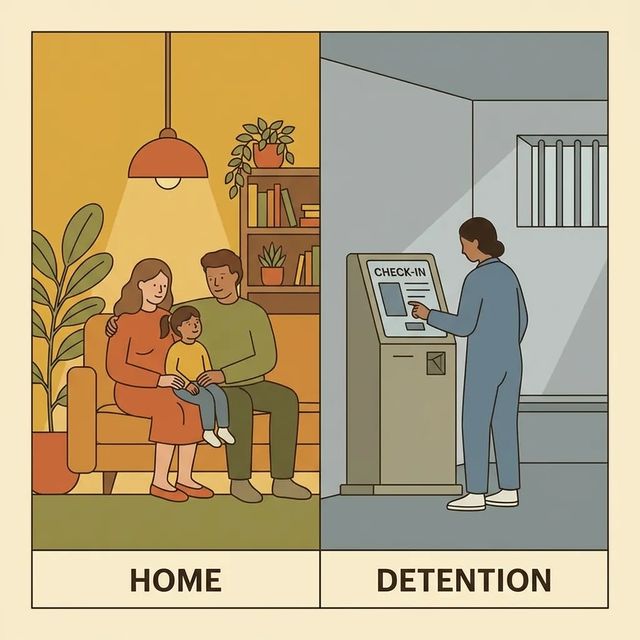W. F. Ramsey Unit
Explore
Find an Inmate at W. F. Ramsey Unit
Search for a loved one and send messages and photos in minutes.

Guides for This Facility

How to schedule your first visit at W. F. Ramsey Unit (TDCJ Online Visitation Scheduler)
The TDCJ Online Visitation Scheduler is straightforward once you know what it expects. Here's how to create your account, get approved, and book your first visit.
Read Guide
How to send money to an inmate at W. F. Ramsey Unit: deposit options and addresses
Sending money to someone at the W. F. Ramsey Unit means using TDCJ's approved Trust Fund options. Here's what you need to know: who can deposit, where to mail money orders or cashier's checks, how to get the deposit slip, and how the free monthly ACH debit works. I'll also cover what to do if you're concerned about pressure or extortion.
Read Guide
How video visits work at W. F. Ramsey Unit: Securus remote visits vs. scheduler Video/Tablet
Setting up a video visit at the W. F. Ramsey Unit? Here's the catch: TDCJ offers more than one "video" option, and they're not the same thing. You might see "Video/Tablet" as a visit type in the TDCJ Online Visitation Scheduler—but TDCJ is clear that this is NOT the Securus Video program.
Read GuideAt a Glance
Visitation
- Weekend visiting hours are Saturday and Sunday, 8:00 a.m. to 5:30 p.m.
- You must create your own TDCJ Online Visitation account; staff cannot create visitor accounts and the scheduler sends a 7‑digit validation code by email to complete registration.
- Tablet video visits must be scheduled online through the TDCJ visitation portal; remote kiosk video may be scheduled through the vendor and is limited to one 60‑minute session per month.
Communication
- You must register your telephone number via the Texas Inmate Telephone Friends & Family Enrollment and may need the inmate’s TDCJ ID to receive calls.
- W. F. Ramsey Unit’s Inmate Technology office hours were updated (effective Feb 2, 2026) to Monday–Friday, 8 a.m.–3 p.m.
- Inmate phones are generally available 5:00 a.m.–12:00 a.m.; calls are limited to 30 minutes and are monitored/recorded (attorney calls excepted).
Mail & Letters
- On Sept 6, 2023 TDCJ moved units to a digital mail platform that scans incoming mail and uploads it to an inmate’s secure tablet.
- To send digital mail for a Ramsey inmate, address items to the TDCJ Digital Mail Processing Center with the inmate’s full name and TDCJ number at PO Box 660400, Dallas TX 75266-0400.
- Legal or privileged mail is generally handled through a separate legal-mail process and is not processed the same way as standard incoming personal mail.
Sending Money
- Only approved senders on the inmate's Approved Visitation List or Inmate Telephone List may deposit money to Ramsey Unit inmates.
- Deposit slips can be requested from the inmate or by sending a self‑addressed stamped envelope to Inmate Trust Fund, PO Box 60, Huntsville TX 77342‑0060.
- Monthly ACH deposits require an ACH authorization form and a voided check mailed to Inmate Trust Fund, PO Box 629, Huntsville TX 77342‑0629.
Based on official sources and community feedback. Learn how we verify
Topic Overviews
Visitation
W. F. Ramsey Unit holds visits on Saturday and Sunday from 8:00 a.m. to 5:30 p.m. Regular visits last two hours, and inmates can typically have one visit per week. To schedule, create your own TDCJ Online Visitation account—staff can't do this for you. Once registered, verify your account using the 7-digit code sent to your email, then complete the background questionnaire. Add the inmate to your profile using their eight-digit TDCJ or SID number; the unit staff will verify your relationship request. The scheduler offers Regular, Contact, and Video/Tablet options. Tablet video visits go through the TDCJ portal, while remote kiosk/video visits are scheduled through the vendor and limited to one 60-minute session per month. Most visits (except attorney–client) may be electronically monitored. Bring a current government-issued ID with a physical address and no more than $35 in cash.
Read full guideCommunication
To receive phone calls from someone at W. F. Ramsey Unit, register your number through the Texas Inmate Telephone Friends & Family Enrollment. You may need the person's TDCJ ID during signup. Phones are generally available from 5:00 a.m. to 12:00 a.m., with calls capped at 30 minutes. Inmates have unlimited minutes per month, but conversations are monitored and recorded—attorney-of-record calls are the exception. Ramsey also offers Securus remote video visits at $10.00 for a 60-minute session, limited to one per month. The TDCJ Inmate Technology office hours (effective Feb 2, 2026) are Monday through Friday, 8 a.m. to 3 p.m. Other options like messaging or tablets vary by unit, so check the Ramsey unit page or approved vendor portals for current availability.
Read full guideMail & Letters
Sending mail to someone at W. F. Ramsey Unit works differently now. Since Sept. 6, 2023, TDCJ uses centralized digital mail: personal letters are scanned and delivered electronically to the inmate's secure tablet instead of being handed over as paper. Address mail to the TDCJ Digital Mail Processing Center at PO Box 660400, Dallas, TX 75266-0400, and include the inmate's full name and TDCJ number. Legal/privileged mail, verified publisher materials, and certain media mail may follow separate routing. Always include your full return address and follow publisher/vendor rules for books and magazines. Prohibited items and unauthorized packages won't be accepted.
Read full guideSending Money
Money deposits for inmates at W. F. Ramsey Unit are restricted to approved senders only. Your name must appear on the inmate's Approved Visitation List or Inmate Telephone List, or your deposit will be rejected. Need a deposit slip? Ask the inmate to send one, or mail a self-addressed stamped envelope to Inmate Trust Fund, PO Box 60, Huntsville, TX 77342-0060. For monthly ACH withdrawals, submit a completed ACH authorization form and a voided check to Inmate Trust Fund, PO Box 629, Huntsville, TX 77342-0629. Commissary spending through eCommDirect is capped by quarter: $70 most quarters, $95 for October–December. The Inmate Trust Fund office can usually confirm receipt, but account details typically go only to the inmate.
Read full guideCommon Questions
Showing 6 of 14Can children under 17 visit W. F. Ramsey Unit?
Some inmates are restricted from having visitors 17 or under. The TDCJ Online Visitation scheduler will let you know if a specific inmate's visit can't include children under 17.
VisitationAre visits at W. F. Ramsey Unit monitored or recorded?
Yes. All inmate visits except attorney–client visits may be electronically monitored.
VisitationHow do I schedule a tablet or remote video visit and how often can I use them?
Tablet video visits must be scheduled online through the TDCJ visitation portal. Remote kiosk/video visits may be scheduled through the vendor website and are limited to one 60-minute session per month (availability varies by unit).
VisitationHow do I register my phone to receive calls from someone at W. F. Ramsey Unit?
Register your telephone number through the Texas Inmate Telephone Friends & Family Enrollment. You may need the inmate’s TDCJ ID during enrollment.
CommunicationWhen can inmates at W. F. Ramsey Unit make phone calls and are calls monitored?
Phones are generally available from 5:00 a.m. to 12:00 a.m., and calls are limited to 30 minutes. Calls are monitored and recorded except for attorney-of-record calls.
CommunicationHow much do Securus remote video visits cost at W. F. Ramsey Unit and how long do they last?
Securus remote video visits cost $10.00 and last 60 minutes. Inmates are limited to one remote video visit per month.
CommunicationMore Guides
Ready to Connect?
Search for your loved one to start communicating today
Did You Know?
W. F. Ramsey Unit is a Texas Department of Criminal Justice facility. You can schedule visits through TDCJ's Online Visitation Scheduler.
This guide is compiled from official facility documentation and community feedback. Learn how we verify
